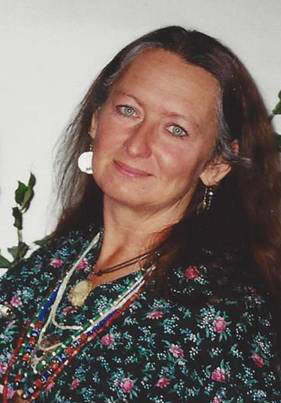Victoria Fortner, herbalist and artist, was a beloved elder and member of the American Herbalists Guild. She passed away nearly four years ago from cancer in Potosi, Missouri, where she lived and worked. Victoria dedicated her life to the Native American community whom she loved and with whom she had great kinship. She was a strong proponent of Native American healing, especially with Native American herbs. She voluntarily and freely administered to the health needs of local Indian friends and family, including those serving time in the penitentiary. Victoria also loved and was an active supporter of the American Herbalists Guild and the ideals it stood for.
Victoria Fortner was not only a wonderful herbalist who helped many people with her skills and kindness but was also a very loving and caring person. She was always interested and invested in those around her. She is greatly missed.
On behalf of Victoria’s legacy and devotion to Native American people and healing, the following is excerpted from a letter written by her close friend, Theresa Friend, about the many generous gifts Victoria gave to her community. In this month of heartfelt matters, we honor her memory and spirit!
Victoria Gene Fortner frequently traveled in Indian Country for personal growth of wisdom from The Elders, to participate in and conduct many ceremonies, all supported by Tribal authority. As I reflect on the criticism of those who are very concerned with genealogy, I remember what I was told by a Lumbee Elder more than three decades past, when we attended a gathering. As people introduced themselves before giving a talk, the Elder leaned over and whispered, “I don’t care what their lineage is. I don’t care who they studied with or associate with. I don’t care what ceremonies they do. All I care about is the quality of the person – their heart. They show that in how they live their lives. That’s what counts, that’s what the Spirits notice.” Wallace Black Elk wisely noted, “For me, if you have one drop of Native blood, then you’re Native. I look at your heart, not your tribal card.” I try to follow this wisdom each day, and live my life gently with a heart full of compassion and kindness for all peoples. I wish this for each person.
I can attest firsthand of Victoria Fortner’s high integrity, inexhaustible work ethic, and depth of knowledge about all people, but with an emphasis on Native cultures in the USA. I have been with her many ties and took notice of the respect given to her by well-respected Elders from many traditions who did not hesitate to speak highly of Victoria and the work she did for Native Peoples in the community who needed clothing, food, or financial support. She supported people in prisons, and was a leader along with Jim Gillihan and Dr. Kit Wesler in the repatriation of Native remains at Wickliffe Mounds, Kentucky.
The Native community supported and encouraged her to continue the work she did. She understood people. She helped people. She was a very intelligent woman who lived through her heart. As a Navajo singer told me once, “The hardest and longest journey is from your heart to your throat.” Victoria made that journey – I pray that more people will.
I can tell you the stories she told me about growing up learning about natural plants and their cures; how she was taught to weave sweet grass baskets; and, how her grandmother beaded moccasins for her Barbie doll. I was actively and proudly there with Victoria many, many times when she was amazingly kind-hearted and generous beyond her means – she gave more than she received. I know of many of her clients who were not able to pay for herbs were gifted with her products so they could stay healthy. I received great benefit from being in Victoria’s life in both small, subtle ways, and large, drastic ways.
Victoria respected all Native Americans and showed respect and honor to all. She donated two of her corn dolls to the National Museum of the American Indian. She did not receive any compensation for them. She was a fastidious researcher and guaranteed that her creations accurately represented culture. Victoria was not the recipient of any grant monies for personal profit from any of the support she provided to Native communities for over four decades. Victoria worked on many issues to preserve Native American culture.
I thought of Victoria as my sister and she lived with me for the last 10 years of her life. I cared for her during her cancer treatments and she died peacefully at our home. Her memorial service was attended by over 90 friends and “family.” When I say family, I mean the family she had chosen. The only blood relative that attended was her sister Christine. In June following her death we had a celebration of her life. People came to the small town of Potosi from all over Missouri, California, Florida, Maryland, Iowa, North Carolina, Indiana and Illinois to honor her. This was her chosen family.
After Victoria passed, some of the Native American inmates at the Farmington, Missouri, prison where Victoria worked requested that I come to the prison so they could sing and drum for me to honor her. She touched so many lives in such a profound way.
Respectfully,
Theresa “Terri” Friend

